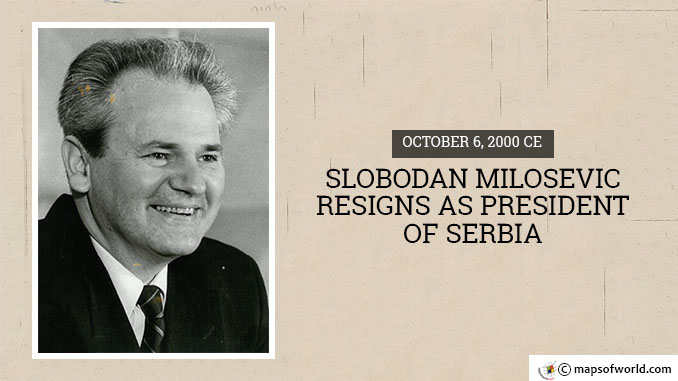Shortly after an election many Serbian citizens considered fraudulent, Slobodan Milosevic resigned from his position as the President of Serbia on October 6, 2000. Months later, he would become the first national leader brought before the International Criminal Tribunal for war crimes. As head of the former Yugoslavia, Milosevic was believed to have encouraged ethnic cleansing in Kosovo, as well as regions of Bosnia, Slovenia and Croatia. After slowly achieving prominence as a businessman and member of the Communist Party, Milosevic leaped up the political ladder by rising to the head of the Belgrade League of Communists City Committee. Just three years later, backed by a variety of Socialist allies in the province of Serbia, he became the third president of the Federal Republic of Yugoslavia. Once in the seat of power, Milosevic pushed a decidedly pro-Serbian agenda. Launching a verbal assault at the leadership of Kosovo, a predominantly-Muslim region in Serbia with only loose ties to the rest of the nation, Milosevic soon signed new laws to bring it under his control. Even as Kosovo declared itself independent in 1990, its Albanian citizens continued to face strong-arm tactics and suppression. Croatia, Bosnia and Herzegovina all found themselves under similar threats aimed toward a unified Serbia. At the same time, rival governments in Montenegro and Vojvodina were replaced with pro-Milosevic politicians. Attempting to consolidate power wherever he could, Milosevic’s rhetoric sounded eerily familiar to many who recalled the early speeches of Adolf Hitler. Civil unrest grew, particularly as the Soviet Union and Eastern Bloc shifted rapidly from single-party Communist systems to democratic elections with representatives from several viewpoints. Bosnia and Herzegovina seceded from the union, leaving only Serbia and Montenegro remaining in Yugoslavia. As the nation disintegrated around him, Milosevic reformed the law to ban free speech by anyone other than journalists. Much like the Nazi press during the 1930s, Yugoslav newspapers focused on non-Serbians as the root cause of troubles in the dying republic. Publishing stories about the bloodthirsty notions of neighboring Croatia or bringing in “experts” to testify to the suspicious activities of the Albanians in Kosovo, Milosevic’s agenda found its way into every home. By the mid-1990s, the Serbians were fighting a war against their former Croatian and Bosnian brothers. Directing troops into the neighboring countries while ordering paramilitary operators into Kosovo for secret missions to exterminate Albanians, Milosevic insisted reports were overblown — in fact, the Serbians were not engaged in combat at all. While the embers cooled after Bosnia and Croatia gained independence, Kosovo burst into flames in 1998. Revolutionary Albanians, hoping to use superior numbers to drive out the Serbian secret police patrolling their streets, instituted a policy of guerilla warfare. When the Serbian military turned toward the conflict, members of NATO launched an air campaign to roll back Milosevic’s army. Convinced of the Serbian leader’s guilt, the United Nations accused him of war crimes on May 24, 1999 and ordered him to appear at The Hague to stand trial. Milosevic, focusing again on his home nation late in 2000, suffered defeat to Vojislav Kostunica of the Democratic Opposition on September 24th. Staying in office for an additional two weeks amid massive demonstrations against voter fraud committed by the Socialists, Milosevic finally accepted the loss and resigned on October 6, 2000 — but not before waiting for the army to turn on him, as well. Six months later, near the end of March 2001, authorities arrived at his home with a warrant for his arrest. Pointing to egregious instances of corruption — embezzlement, abuse of power, even ordering the murder of political opponents — police arrested Milosevic. Transferred to UN personnel at the Bosnian border in June, he faced trial at the International Criminal Tribunal beginning in late January 2002 by describing the proceeding as an “evil and hostile attack” against his character. Four years later, while awaiting the verdict for his lengthy trial, Milosevic died of a heart attack on March 11, 2006. Also On This Day: 1499 – French King Louis XII occupies Milan 1889 – Thomas Edison demonstrates an early form of the motion picture 1927 – The Jazz Singer, the world’s first major movie with sound, premieres in New York City 1976 – Premier Hua Guofeng ends the Cultural Revolution in the People’s Republic of China by having the Gang of Four arrested 1981 – Egyptian President Anwar Sadat is assassinated
October 6 2000 CE – Slobodan Milosevic Resigns as President of Serbia
Shortly after an election many Serbian citizens considered fraudulent, Slobodan Milosevic resigned from his position as the President of Serbia on October 6, 2000. Months later, he would become the…
593
